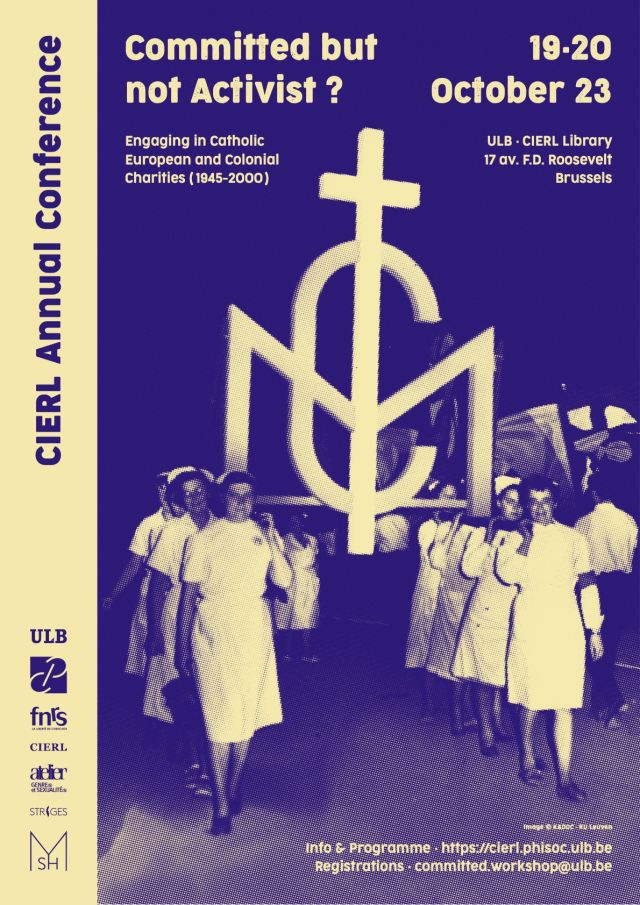Workshop "Committed but not activist?: Engaging in Catholic European and Colonial Charities (1945-2000)"
Du 19/10 au 20/10/2023
With Inmaculada Blasco Herranz, Universitad de la Laguna, Anne-Sophie Crosetti, Université libre de Bruxelles, Felix Deckx, KU Leuven, Claire Fredj, Université Paris-Nanterre, Silvia Inaudi, Università di Torino, David Kilgannon, University of Galway, Carmen M. Mangion, University of Birkbeck, London, Juliette Masquelier, Université libre de Bruxelles, Catherine Maurer, Université de Strasbourg, Els Minne, KU Leuven, Amélie Rabine, Université Paris 8, Yann Raison du Cleuziou, Université de Bordeaux, Anca Şincan, Institutul de Cercetari Socio-Umane Gheorghe Şincai, Charlotte Walker-Said, MSH Invited Professor, City University of New-York.
The conference aims to examine the forms of Catholic commitment in European social and healthcare charities after the Second World War, whether they were officially Catholic or involved significant numbers of Catholics. By bringing together the experiences of different sectors of healthcare and social aid, in different European countries and in the European colonies or former colonies, we want to paint a picture of European Catholic commitment and the changes it underwent after the war, between transnational continuities and national specificities of the aid and social security systems and of the relationship between the States and the Church, between private and public services. The workshop will consider the diversity of Catholic contribution to social, healthcare and sanitary services: from assistance (accommodation, canteens, social secretariats, etc.) to the various medico-social services (dispensaries, medical consultation centers for infants, visits to the sick, family planning, child daycare, etc.) and to missionary, humanitarian and development charities. The profiles of the actors are numerous – physicians, nurses, social workers, priests, religious men and women, lay people, men, women or couples; professionals or volunteers – and complex: particular attention will be paid to the biographical, activist, voluntary and/or professional trajectories, to the porosity of these categories and to the way in which the actors look at their path.
One point of entry into the diversity of these works is the relationship that committed actors have to 'politics'. Can we distinguish the particular characteristics of the Catholic relationship to healthcare and social work and social change? Or, on the contrary, did the sometimes-cultivated opposition between faith-based and secular organisations only lie in the discourse, while the forms of mobilisation were similar, possibly even porous? What were the advantages and disadvantages of the Catholic label in the field of social welfare in the age of the 'social state' and secularisation, and how were these legacies negotiated? Another entry point is the transversal question of how Catholic charities and actors adapted to social changes in the second half of the 20th century, and what were the individual and collective processes of negotiation when facing change. How did Catholic Charities adapt to the many changes that European societies underwent, and how have these changes affected the forms and nature of the actors' commitment?
Four axes have been chosen to examine the forms of Catholic commitment and their contemporary changes: the religious meaning of commitment, professionalisation, the relationship to otherness and the relationship to social change. Particular attention will be paid to issues of gender, class and “race” in the treatment of these questions, favouring an intersectional approach (Crenshaw, 1991). Indeed, these categories are fundamental for analysing the relationships with beneficiaries, the dynamics of specialisation and role distribution in associations, particularly in the context of care work. We will also pay particular attention to biographical trajectories, activist, volunteer and/or professional 'careers', the porosity of these categories, and the generational dynamics of commitment.
Organising Committee: Anne-Sophie Crosetti (FNRS/ULB), Juliette Masquelier (FNRS/ULB)
Scientific Committee: Guillaume Dye (Université libre de Bruxelles), Jean-Pascal Gay (UC Louvain), Amandine Lauro (FNRS / Université libre de Bruxelles), David Paternotte (Université libre de Bruxelles), Caroline Sägesser (CRISP / Université libre de Bruxelles), Cécile Vanderpelen (Université libre de Bruxelles), Kaat Wils (KU Leuven).
The workshop will be held in English.
From 19 October at 9am to 20 October at 5pm
CIERL Library
17 Avenue F.D. Roosevelt
1050 Brussels
Free registration by contacting email address.

